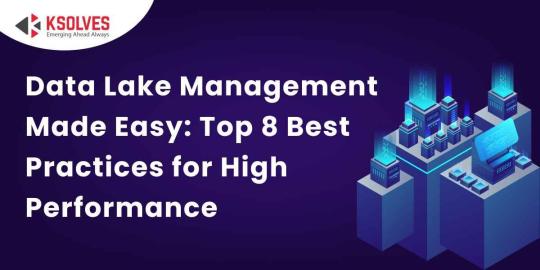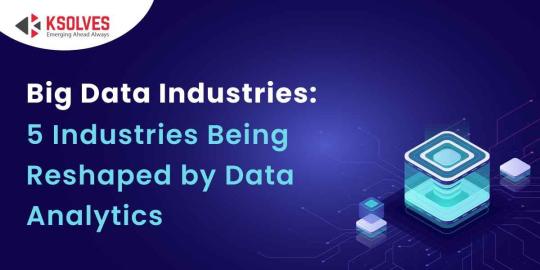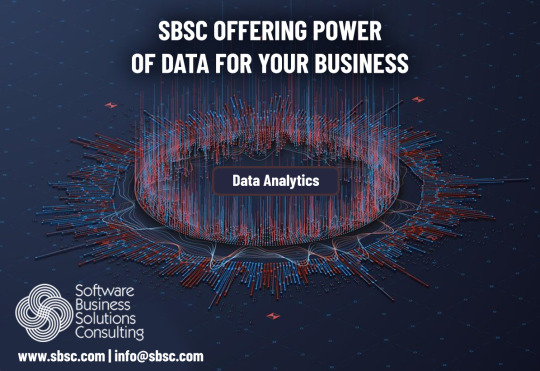#big data consulting
Explore tagged Tumblr posts
Text
https://www.ksolves.com/blog/big-data/data-lake-management-made-easy-top-8-best-practices-for-high-performance

In this blog, we discuss the top 8 Data Lake best practices for high-performance Data Lakes. But, these Data Lake best practices aren’t just for data experts. They are for anyone who wishes to maximize their investment in a Data Lake. These best practices will assist you in driving business growth and making data-driven decisions whether you’re a business owner, analyst, or data scientist.
2 notes
·
View notes
Text
Business Intelligence Solutions: Unleashing the Power of Managed Analytics

In today's dynamic business landscape, the effective utilization of data is pivotal for informed decision-making and sustained growth. Business Intelligence (BI) solutions have emerged as a cornerstone, offering organizations the ability to glean actionable insights from their data. This article explores the transformative impact of BI solutions and how managed analytics, coupled with outsourced IT management, is reshaping the way businesses harness the power of data.
1. Proactive IT Support and Managed IT Services:
BI solutions thrive in an environment supported by proactive IT services. Managed IT services, which include proactive support and maintenance, ensure the seamless operation of BI tools. This proactive approach not only enhances the reliability of analytics but also minimizes downtime, allowing businesses to make real-time decisions.
2. Advanced Analytics and Data Visualization Services:
Managed analytics encompass advanced analytics services that go beyond basic reporting. Data visualization services play a crucial role, translating complex data sets into visually appealing and understandable insights. This facilitates better communication and comprehension of data-driven findings across all levels of an organization.
3. Cloud Management Solutions and Migration Strategies:
The integration of cloud management solutions is a game-changer for BI. Cloud migration solutions offer scalability, flexibility, and cost-efficiency. Managed BI services leverage cloud optimization solutions, ensuring that businesses make the most of cloud resources while maintaining peak performance.
4. Data Science Solutions and Hybrid Cloud Integration:
BI solutions often involve intricate data science methodologies. Managed analytics extend to data science solutions, enabling organizations to employ predictive analytics and machine learning for more accurate forecasting. Hybrid cloud solutions provide the necessary infrastructure for hosting and processing data across different environments securely.
5. IT Consultation Services and Strategic Managed Services:
Strategic IT consultation services are instrumental in aligning BI strategies with overall business objectives. Managed services, including serverless computing and big data consulting, are designed to optimize the performance of BI tools, ensuring they adapt to evolving business requirements.
6. Cloud Consulting Services and Holistic Cloud Management:
BI solutions benefit from specialized cloud consulting services. These services guide organizations in selecting the most suitable cloud platforms and architectures for their BI needs. Holistic cloud management services oversee the entire cloud ecosystem, ensuring optimal performance and security.
In conclusion, the convergence of BI solutions and managed analytics is reshaping the way businesses interpret and leverage their data. With the right blend of outsourced IT management, advanced analytics, and cloud solutions, organizations can unlock the full potential of their data, gaining a competitive edge in today's data-driven era.
#it consultation services#managed service#serverless computing#big data consulting#business intelligence solutions#Scholarnest#Scholarnest Technologies#cloud consulting services#cloud management#cloud management services#data visualization services#managed it services#advanced analytics services#cloud management solution#cloud migration solutions#cloud optimization solutions#data science solutions#hybrid cloud solutions#outsourced it management#proactive it support
0 notes
Text
The power of excellent customer service is to Increase sales and revenue. Satisfied customers are more likely to make repeat sales and even sale more in each transaction.
0 notes
Text
Firms often struggle with distinct data-related challenges, such as data collection, storage, processing, analysis, and interpretation. It is where big data consulting comes into play.
0 notes
Text
For anyone currently in school or recently in school

I am doing a few guest lectures at some of the universities in my state and working on my presentation. Curious if anyone has any recommendations of topics they really enjoyed from a past guest speaker that isn't major/field-specific?
#college#college student#studying#studyblr#school#university#accounting#finance#consulting#data analytics#data analysis#data visualization#big data#data
22 notes
·
View notes
Text
Learn how Big Data services enhance decision-making, efficiency, and customer experiences. Explore real-world use cases and future trends. Read more: https://www.bestpeers.com/blog/unlocking-business-potential-with-big-data-services
#big data consulting services#custom big data solutions#enterprise data management services#scalable big data infrastructure#big data service providers in india
0 notes
Text
Geld verdienen met kunstmatige intelligentie
#kunstmatige intelligentie#geld verdienen#werken op afstand#klantenservice#online onderwijs#datawedstrijden#verkoopmodellen#AI-consultancy#contentcreatie#digitale marketing#kunstgeneratie#AI-tools#productontwikkeling#affiliate marketing#data-analyse#SEO#copywriting#webdesign#AI-training#AI-toepassingen#freelanceprojecten#investeringen#softwareontwikkeling#big data-analyse#het creëren van online cursussen#socialmediamarketing#analysetools#app-ontwikkeling#vertaaldiensten#rapportages schrijven
0 notes
Text
Big Data Consulting & Analytics Services in Dubai | Premier Globe Equipment Trading LLC
Premier Globe Equipment Trading LLC offers expert Big Data consulting and analytics services in Dubai, helping businesses turn complex data into valuable insights. Our team provides end-to-end services, from data strategy and implementation to advanced analytics and reporting, ensuring your business can make informed, data-driven decisions. We specialize in delivering tailored solutions that optimize operations and improve business performance. Ready to unlock the potential of your data? Visit our official website today and discover how our Big Data consulting services can elevate your business in Dubai!

0 notes
Text
Guide To Web3 Development: Costs And Benefits

The rapid rise of Web3 technologies is reshaping the digital world, introducing new ways of interacting with the internet through decentralized systems. Web3, built on blockchain technology, brings concepts like decentralized finance (DeFi), non-fungible tokens (NFTs), and decentralized applications (dApps) to the forefront. For businesses looking to build on Web3, understanding the associated development costs and potential benefits is essential to making informed decisions.
This guide will delve into the costs of Web3 development, breaking down key factors that impact pricing, as well as the benefits that make it a worthy investment for organizations.
Understanding Web3 Development Costs
Building a Web3 application is complex and differs from traditional web development in several ways, primarily due to the decentralized nature of blockchain and smart contract integration. The costs associated with Web3 development vary based on factors like the type of platform being built, the blockchain being used, and the overall complexity of the project. Below are the major factors influencing Web3 development costs:
1. Project Scope and Complexity
The scope and complexity of your Web3 project are perhaps the most significant cost drivers. A simple decentralized application (dApp) with basic functionality will cost significantly less than a multi-chain decentralized exchange (DEX) or a complex decentralized finance (DeFi) platform.
Types of Web3 Projects:
dApps: Simple decentralized apps with a limited number of features, such as a token wallet or an NFT marketplace, can be relatively affordable.
Smart Contracts: Writing and deploying smart contracts requires a high level of security and precision since errors can lead to costly vulnerabilities. The complexity of the contract will directly affect development costs.
NFT Platforms: NFT marketplaces or platforms are more complex due to the integration of minting, trading, and royalties systems, often pushing costs higher.
DeFi Platforms: Decentralized finance platforms require intricate financial logic, real-time data feeds, and robust security, making them among the most expensive Web3 projects to develop.
2. Blockchain Platform
The blockchain platform you choose for your Web3 development also plays a significant role in determining costs. Ethereum, being the most popular and established platform for smart contracts, often leads to higher development and transaction fees due to its congestion and gas fees.
Other blockchains, such as Solana, Binance Smart Chain (BSC), and Polygon, offer cheaper alternatives but may have different levels of developer community support or toolsets. The blockchain platform chosen influences not just the development costs but also the ongoing operational expenses.
Ethereum: High gas fees and slow transaction times, but it is the most established and secure for Web3 development.
Solana: Offers faster transactions and lower costs but may come with less robust development resources.
Binance Smart Chain (BSC): Cheaper transaction fees compared to Ethereum and has gained popularity for DeFi and NFT projects.
Polygon: A Layer-2 scaling solution for Ethereum that offers reduced costs and increased transaction speeds.
3. Development Team
The size and expertise of the development team have a direct impact on costs. Web3 development requires specialized skills in blockchain development, smart contracts, and cryptographic algorithms, which means you’ll need a team of experts. Hiring a Web3 development team can include various costs depending on whether you use freelancers, an agency, or an in-house team.
Freelancers: Often more affordable, but they may lack the broad experience needed for larger or more complex projects.
Development Agencies: A specialized Web3 development agency will provide a more comprehensive solution, with designers, developers, and project managers working together. However, this is usually the most expensive option.
In-House Team: Building an in-house Web3 development team requires long-term investment, as you’ll need to hire experts in blockchain, cryptography, and smart contracts. This option is best for businesses that plan to continually develop and maintain decentralized projects.
4. Smart Contract Audits and Security
Security is paramount in Web3 development services, especially when financial transactions are involved, as seen in DeFi projects or NFT marketplaces. Smart contracts are immutable, meaning they can’t be altered once deployed, making it crucial to ensure their security from the start.
Smart contract audits, conducted by third-party security firms, are essential to ensure that the code is free of vulnerabilities. Depending on the complexity of your contract, audit costs can range from several thousand dollars to tens of thousands. The cost of not performing audits can be even higher, with high-profile hacks in the DeFi space leading to multi-million-dollar losses.
5. Ongoing Maintenance and Updates
Web3 projects require ongoing maintenance, including server upkeep, smart contract upgrades, and responding to user feedback. While decentralized systems may reduce the need for continuous updates compared to traditional software, factors like security patches, performance optimization, and user experience improvements still necessitate ongoing investment.
6. Marketing and Community Building
One often-overlooked cost in Web3 development is marketing and community building. A major component of Web3 success hinges on building a strong, engaged community that supports the platform, particularly for projects involving tokens or NFTs. Marketing efforts can include creating content, running social media campaigns, building partnerships, and participating in decentralized communities. This adds to the overall cost, but it’s essential for user adoption and network growth.
Benefits of Web3 Development
Despite the associated costs, Web3 development offers significant benefits that make it a worthwhile investment. These benefits, driven by decentralization, transparency, and user empowerment, can transform businesses and industries. Here’s a breakdown of the key benefits:
1. Decentralization and Ownership
Web3 development is built on decentralized infrastructure, meaning that control over data, assets, and applications is no longer held by a single entity. This allows users to take ownership of their data, interactions, and assets on the platform. For businesses, this decentralization increases transparency and reduces reliance on intermediaries, offering a more equitable model.
For instance, NFT marketplaces allow creators to retain ownership of their work and receive royalties for future sales, while DeFi platforms enable users to manage their finances without traditional banks. Decentralization also enhances security by reducing the risk of single points of failure, which are common in centralized systems.
2. Trust and Transparency
Blockchain, the backbone of Web3, provides inherent transparency because all transactions and data are recorded on a public, immutable ledger. This builds trust among users, especially in sectors like finance, real estate, and supply chain management, where transparency is critical.
Smart contracts further enhance this trust by executing agreements without intermediaries, ensuring that transactions occur exactly as programmed. This eliminates the need for middlemen, reduces operational costs, and increases the speed of transactions.
3. Monetization Opportunities
Web3 development opens up numerous new avenues for monetization. Whether through NFTs, token economies, or decentralized finance, businesses can create models that allow users to participate directly in value generation. Tokenization, in particular, provides a powerful way to reward users for their participation or contributions to a platform.
For instance, platforms like Axie Infinity and Decentraland have created entire economies where users can earn by playing games or contributing to virtual worlds. DeFi platforms also enable users to earn yields on their crypto assets without relying on traditional financial institutions.
4. Interoperability
Web3 promotes interoperability between platforms, blockchains, and applications, allowing for seamless integration and collaboration. With cross-chain functionality, users can transfer assets, data, and services across different ecosystems, providing more flexibility and expanding the potential user base.
For businesses, this means the ability to tap into multiple blockchain networks, attracting a wider range of users and reducing the barriers to entry across different markets.
5. Enhanced Security and Privacy
Web3 applications often rely on cryptography to secure transactions and protect user privacy. Decentralized networks are generally more secure than traditional centralized systems since there is no single point of failure. Additionally, blockchain’s transparent nature allows users to verify the authenticity and integrity of transactions or data without exposing personal information.
In a world where data breaches and privacy concerns are increasingly prevalent, Web3 offers a more secure and private way for users to interact with applications and manage their digital identities.
Conclusion
While the costs of Web3 development can vary widely depending on the complexity of the project, blockchain platform, and security measures required, the benefits make it a promising investment for businesses looking to capitalize on the future of the internet. Decentralization, enhanced security, new monetization models, and increased transparency offer significant advantages that set Web3 apart from traditional web development.
By carefully weighing the costs against these benefits, businesses can make informed decisions about when and how to invest in Web3 development, positioning themselves for success in this rapidly evolving digital landscape.
Source URL: www.joripress.com/guide-to-web3-development-costs-and-benefits
0 notes
Text
https://www.ksolves.com/blog/big-data/big-data-industries-5-industries-being-reshaped-by-data-analytics

With this power, data analytics has totally altered the industrial scenario, contributing to innovation and promoting competitive advantage. Let us now explore the many use cases of data analytics and how it is reshaping these industries in this blog.
1 note
·
View note
Text
Future-Proofing Your Business: The Role of Managed Services in Tech Evolution

In the ever-evolving landscape of technology, businesses are increasingly turning to managed services to stay ahead of the curve and future-proof their operations. As the demands on IT infrastructure grow, leveraging outsourced IT management becomes not just a choice but a strategic necessity. This article explores the pivotal role of managed services in driving tech evolution and ensuring the resilience and agility of your business.
The Foundations of Managed Services:
1. Outsourced IT Management:
Managed IT services involve outsourcing the responsibility for maintaining, anticipating, and managing a company's IT systems. This approach allows businesses to tap into the expertise of external providers, freeing up internal resources to focus on core business functions.
2. Proactive IT Support:
Unlike traditional reactive IT support, managed services operate proactively. Providers actively monitor systems, identify potential issues before they escalate, and implement preventive measures, ensuring a more stable and reliable IT environment.
Advanced Tech Solutions:
3. Data Visualization and Advanced Analytics:
Managed services extend beyond basic IT support, offering specialized solutions such as data visualization and advanced analytics services. This empowers businesses to derive meaningful insights from their data, enabling better decision-making and strategic planning.
4. Cloud Management and Migration Solutions:
Cloud computing is at the forefront of tech evolution, and managed services play a crucial role in facilitating seamless cloud management and migration solutions. Whether it's adopting a hybrid cloud approach or optimizing existing cloud infrastructure, managed services ensure efficient and secure cloud operations.
5. Data Science Solutions:
The integration of data science solutions into managed services allows businesses to harness the power of predictive analytics, machine learning, and artificial intelligence. This not only enhances operational efficiency but also opens avenues for innovation and competitive advantage.
6. Hybrid Cloud Solutions:
Managed services excel in providing hybrid cloud solutions, allowing businesses to balance the benefits of both public and private clouds. This flexibility enables organizations to adapt to changing needs, ensuring optimal performance and scalability.
Strategic IT Consultation:
7. IT Consultation Services:
Managed service providers offer strategic IT consultation services, guiding businesses through technology decisions aligned with their goals. From serverless computing to big data consulting, these consultations ensure that IT infrastructure is not just maintained but strategically aligned with business objectives.
8. Business Intelligence Solutions:
Harnessing business intelligence solutions through managed services enables organizations to turn data into actionable insights. This facilitates informed decision-making, driving efficiencies and fostering a data-driven culture.
9. Cloud Consulting Services:
Cloud adoption is a transformative journey, and managed services provide crucial support through cloud consulting. This includes planning, implementation, and ongoing management, ensuring businesses leverage the full potential of cloud technologies.
The Evolutionary Edge:
10. Cloud Management Services:
As businesses increasingly rely on cloud technologies, managed services offer specialized cloud management services. This includes optimizing resources, ensuring security, and implementing best practices for efficient cloud operations.
In conclusion, future-proofing your business in the rapidly evolving tech landscape necessitates a strategic approach to IT management. Managed services not only provide essential IT support but also act as catalysts for innovation and technological advancement. By embracing outsourced IT management, businesses can tap into a wealth of expertise, leverage advanced tech solutions, and receive strategic guidance, ensuring they are well-prepared for the challenges and opportunities that lie ahead. The future belongs to those who proactively evolve, and managed services are the key to staying ahead of the curve.
#it consultation services#managed service#serverless computing#big data consulting#business intelligence solutions#cloud consulting services#cloud management#cloud management services#data visualization services#managed it services#advanced analytics services#cloud management solution#cloud migration solutions#cloud optimization solutions#data science solutions#hybrid cloud solutions#outsourced it management#proactive it support
1 note
·
View note
Text
Maximizing Big Data value involves leveraging data assets to achieve business objectives and create value for the company. Know More @ https://bit.ly/43UVmbq
0 notes
Text
AI Consulting Business in Construction: Transforming the Industry
The construction industry is experiencing a profound transformation due to the integration of artificial intelligence (AI). The AI consulting business is at the forefront of this change, guiding construction firms in optimizing operations, enhancing safety, and improving project outcomes. This article explores various applications of AI in construction, supported by examples and statistics that…
#AI Consulting Business#AI in Construction#AI Technologies#artificial intelligence#Big Data Analytics#Construction Automation#construction efficiency#construction industry#Construction Safety#construction sustainability#Data Science#Generative Design#IoT Technologies#Labor Optimization#Machine Learning#Predictive Analytics#project management#quality control#Robotics#Safety Monitoring
0 notes
Text

#Finance#Business#Work Meme#Work Humor#Excel#Hilarious#funny meme#funny#accounting#office humor#consulting#big data#data analysis#data visualization#data analytics#data#dashboard commentary#tableau#power bi
13 notes
·
View notes
Text
Unlocking the Power of Data: Ecorfy’s Innovative Data Engineering Solutions
Introduction:
In today’s fast-paced digital landscape, data is more than just a byproduct of business operations; it is the foundation of decision-making, strategy, and growth. Organizations generate vast amounts of data daily, but the real challenge lies in managing, processing, and transforming this data into actionable insights. This is where Ecorfy’s Data Engineering services come into play, offering businesses a comprehensive solution to streamline their data management and harness its true potential. Whether you're looking for data engineering services in Texas or data engineering solutions in California, Ecorfy delivers top-tier results to clients across the USA.
What is Data Engineering?
Data engineering is the process of designing, building, and maintaining the infrastructure that allows for the collection, storage, and analysis of large datasets. It serves as the backbone of data-driven organizations, ensuring that data is accessible, reliable, and usable across various platforms. From designing efficient pipelines to ensuring data integrity, data engineering is critical for enabling advanced analytics, machine learning, and artificial intelligence applications. Ecorfy’s data engineering consultants in the USA are experts in optimizing this process, ensuring that businesses get the most from their data.
Ecorfy’s Approach to Data Engineering
Ecorfy understands the complexities associated with managing large datasets, and their team of experts is equipped to handle every aspect of the data engineering lifecycle. Their solutions are designed to help businesses scale efficiently by building robust data architectures that support long-term growth and agility.
1. Data Integration
Ecorfy’s data engineering team excels at integrating data from disparate sources into a unified platform. Whether it's cloud data, structured databases, or unstructured data from various sources like social media and IoT devices, Ecorfy’s integration techniques ensure that businesses have a single source of truth for all their data-related needs. This integrated approach enhances data quality, making analytics more precise and decision-making more informed. Their big data engineering services in New York stand out as a benchmark for real-time and high-volume data management.
2. Data Pipeline Creation
Ecorfy specializes in creating seamless data pipelines that automate the flow of data from multiple sources into a central data repository. This enables businesses to handle real-time data processing and ensure that data is available for immediate use by analytics and business intelligence tools. The automation reduces human errors, enhances efficiency, and ensures that data remains consistent and up-to-date. With big data consultants in New York, Ecorfy provides robust solutions that make real-time data processing effortless.
3. Data Storage and Architecture
Proper storage and efficient data architecture are crucial for handling large datasets. Ecorfy ensures that businesses have the right storage solutions in place, whether on-premise or in the cloud. Their team also ensures that data is stored in ways that optimize retrieval speed and accuracy, implementing the best database management systems that are scalable and secure. Their data engineering solutions in California offer a diverse range of options suited to different business needs.
5. Big Data Handling and Real-Time Processing
With the rise of big data, businesses often struggle to process and analyze large volumes of data quickly. Ecorfy offers cutting-edge solutions for handling big data and real-time analytics, allowing companies to gain insights and respond to business needs without delays. From implementing technologies like Apache Hadoop to optimizing data workflows, Ecorfy makes big data accessible and manageable. Their big data consultants in New York offer specialized expertise to ensure that your big data projects are handled with precision and foresight.
Conclusion
In the data-driven era, effective data management is critical for business success. Ecorfy’s Data Engineering services offer businesses the tools they need to unlock the full potential of their data. By providing seamless integration, optimized data pipelines, scalable architecture, and real-time processing, Ecorfy helps organizations stay ahead of the competition in an increasingly data-centric world. Whether you're seeking data engineering consultants in the USA or industry-leading data engineering services in Texas and California, Ecorfy is your go-to partner for comprehensive, scalable data solutions.
0 notes
Text

Welcome to the digital era, where data reigns as the new currency.
In modern information technology, the term “Big Data” has surged to the forefront, embodying the exponential growth and availability of data in today’s digital age. This influx of data encompasses vast volumes, generated at unprecedented speeds and with diverse varieties, presenting both challenges and opportunities across industries worldwide.
To unlock the true potential of big data, businesses need to address several critical areas like #BigDataCollection and #DataIntegration, #DataStorage and Management, #DataAnalysis and #DataAnalytics, #DataPrivacy and #DataSecurity, Innovation and Product Development, Operational Efficiency and Cost Optimization. Here at SBSC we recognize the transformative power of #bigdata and empower businesses to unlock its potential through a comprehensive suite of services: #DataStrategy and #Consultation: SBSC’s Tailored advisory services help businesses define their Big Data goals, develop a roadmap, and align data initiatives with strategic objectives.
#DataArchitecture and #DataIntegration: We Design and implementation of scalable, robust data architectures that support data ingestion, storage, and integration from diverse sources. #DataWarehousing and Management: SBSC provides Solutions for setting up data warehouses or data lakes, including management of structured and unstructured data, ensuring accessibility and security. Data Analytics and Business Intelligence: Advanced analytics capabilities leveraging machine learning, AI algorithms, and statistical models to derive actionable insights and support decision-making.
#DataVisualization and Reporting: Creation of intuitive dashboards and reports that visualize key insights and performance metrics, enabling stakeholders to interpret data effectively. #CloudServices and Infrastructure: Leveraging #cloudplatforms for scalability, flexibility, and cost-effectiveness in managing Big Data environments, including migration and optimization services Continuous Improvement and Adaptation: Establishment of feedback loops and metrics to measure the impact of Big Data initiatives, fostering a culture of continuous improvement and adaptation.
By offering a comprehensive suite of services in these areas, SBSC helps businesses to harness the power of Big Data to drive innovation, improve operational efficiency, enhance customer experiences, and achieve sustainable growth in today’s competitive landscape
Contact SBSC to know the right services you need for your Business
Email: [email protected] Website:https://www.sbsc.com
#Big Data Collection#big data#Cloud Services Consultation#Data Warehousing#Data Strategy#Data Storage#Data Security#Data Privacy#Data Integration#Data Architecture#Data Analysis
0 notes